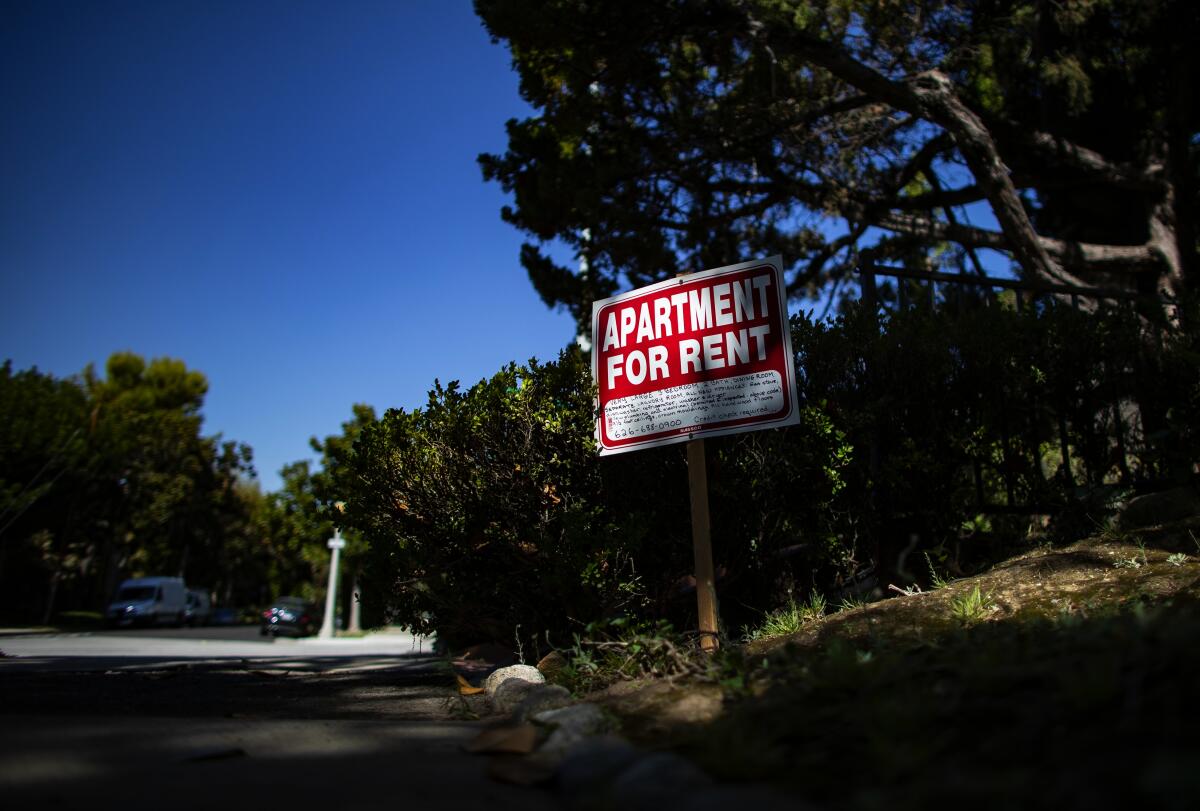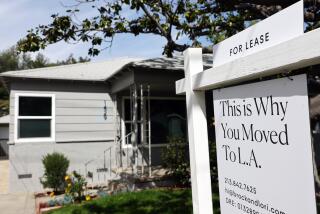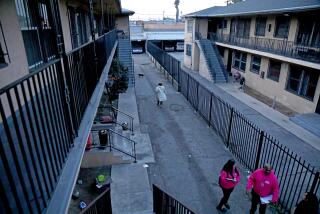‘All my income is gone’: Tenants, landlords voice coronavirus fears as rents come due

- Share via
Tenants and landlords throughout Southern California are bracing for next Wednesday, when April rents are due just as thousands of people have lost their jobs and most business have been shut down as a result of the coronavirus pandemic.
Government officials have provided certain protection against evictions for renters and limited mortgage relief for landlords affected by the virus. Some landlords say they are trying to work out deferred payment plans with tenants to make up for any missed rental payments.
But stress, fear and confusion remain, especially in Los Angeles County, where 55% of residents are renters and rents are among the highest in the nation.
Here’s how are a few tenants and landlords are grappling with the crisis:
‘I’m not going to have the money’
Martin Isenberg lost all three jobs he was working when the coronavirus crisis hit and businesses shut down.
“We’re planning to have a conversation with our landlord and see if maybe we can do half the rent,” said Isenberg, 27, who shares a $2,000-a-month apartment with his still-working girlfriend in the Highland Park neighborhood of Los Angeles.
“All of my income is gone,” he said, referring to his jobs as a substitute schoolteacher, bartender and freelance Hollywood set dresser. “I was working constantly and still struggling to pay rent, so of course when something like this happens, I’m not going to have the money.
“I’m just trying to be as frugal as possible and I applied for unemployment,” Isenberg said, adding that he’s concerned about having to make up for any unpaid rent in the months to come.
“When I finally do go back to work when this is all over, and I have zero dollars in my savings account because I used it all on groceries and the basic expenses of living, then I’m expected to pay my rent for that month and be given six months to pay back the rent that I didn’t pay,” he said.
“So essentially I’ll be going into debt for a crisis that was not of my causing,” Isenberg said. “I’m going to have to pay twice as much rent as I was before, which is not a solution.”
‘The rents cover our living’
Lisa McFadden Neath, who with her mother owns eight commercial and residential properties in Bakersfield and San Luis Obispo, said the situation “is very scary. It keeps me awake at night.”
Her commercial tenants include a hairdresser and real estate agent, and her apartment tenants include a bartender, waiter, winery worker and plumber. She pays the utilities for her commercial clients.
“Every commercial tenant I have has asked if I can work with them on their rent,” as have three of her residential tenants, McFadden Neath said. “I’ve told them we’re all in this together and of course I will do what I can to help them while keeping the lights on.”
But McFadden Neath, 51, said she needs the rent payments. “We’re a small business,” she said. “I have a mortgage on my house that I have to cover. I have my mom, and she has a mortgage on her home. The rents cover our living.”
‘I can’t sleep’
Cara Guglielmino is an actor and comedian who also was working as a restaurant server when she saw an Instagram post that her Beverly Center restaurant, Angler, had closed due to the pandemic. “That was news to us because they had not informed us that they were closing,” she said.
Now, Guglielmino doesn’t know how she’ll pay the $1,850 monthly rent for her one-bedroom apartment in Hollywood.
“I’m stressed, I can’t sleep,” she said. “I don’t know what to do. I’m trying really hard to not spend on anything that isn’t within the basic necessities.”
Guglielmino, 30, said her landlord posted a notice on her door that tenants affected by the virus would have up to six months after the emergency eases to repay missed rent. But that was of little solace to her.
“What we’ll be having to do is pay rent plus half-a-rent until we catch up,” she said. In the meantime, “it’s not like I can take my unemployment [benefit] and save it for later.”
Guglielmino added: “We don’t know where restaurants are going to be after this. Are people going to want to go out? Are people going to be staffing [restaurants] the same was as they were staffing before this?
“There’s a ton of us [renters] that are all in the same boat and we’re all really worried,” she said. “It’s probably going to increase the homeless population at the end of this. The landlords need to allow a rent pause. Rent will not be deferred and will not be owed. This is a crisis.”
‘I will not kick them out’
Sydney Wen owns a three-unit rental triplex in Torrance, and one of his tenants is a babysitter who suddenly lost her job because her clients were sent home to work, removing the need for her services.
“I will support her” by trying to find a negotiated solution, Wen said. “I hope my other two tenants will keep paying rent. But if they stop, I will continue to support them, too. I will not kick them out. I used to be on food stamps, I know their struggle.”
But Wen, 46, said he faces a crisis as well because, like many landlords, he has certain fixed costs — a mortgage on the property, insurance and taxes, utilities and maintenance costs that must be paid.
“I have emergency savings, but if this goes on for five or six months, I’m going bankrupt,” Wen said. “I don’t see any communication from local and state governments that there’s any sort of forbearance being given to individual landlords.”
‘Forbearance ... until the tenant can catch up’
Robert Hart is chief executive of TruAmerica Multifamily, a Century City firm that owns about 11,000 rental units throughout California with roughly 33,000 tenants.
Many tenants “will pay their rent because they still have the ability to, they’re not out of work” even if working from home, or they’re retirees on fixed incomes, Hart said. But there will be other tenants that simply don’t have the cash.
Hart said he and many other landlords “absolutely” would try to help those tenants get through the crisis by working out payment plans. “That workout, from our point of view, is a forbearance of rent for a period of time until the tenant can catch up,” he said.
As another example, Hart pointed to Irvine Co. in Orange County, which has told tenants that if they’re unable to pay their full rent in April and May, they can defer half of that owed rent over a six-month period.
But such payment plans and government orders relaxing rules on evictions are being misinterpreted by some tenants as meaning they don’t have to pay rent at all in April if they’ve been affected by the virus, Hart said.
“They’re not saying you don’t have to pay your rent; they’re saying you don’t have to pay it now,” he said.
More to Read
Inside the business of entertainment
The Wide Shot brings you news, analysis and insights on everything from streaming wars to production — and what it all means for the future.
You may occasionally receive promotional content from the Los Angeles Times.











